Iran 'Expects' Oil Seized In Greece To Be Returned After Court Ruling
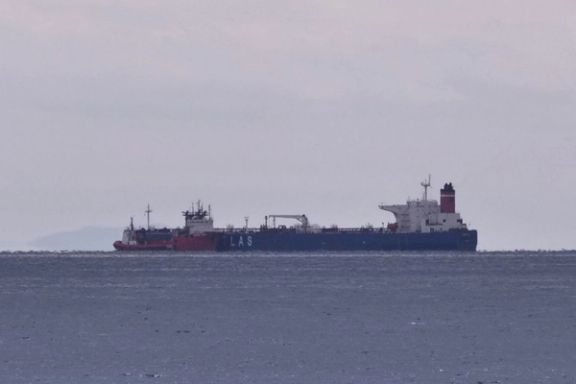
Iran’s says it expects an oil cargo earlier seized by Greece to be returned in full following a Greek court overruling the original decision to confiscate.

Iran’s says it expects an oil cargo earlier seized by Greece to be returned in full following a Greek court overruling the original decision to confiscate.
The Greek court overturned an earlier court ruling that had allowed the confiscation in May by the United States of part of a cargo of Iranian oil on an Iranian-flagged tanker off the Greek coast, Reuters reported on Wednesday.
The court ruling has not yet been made public, but Iranian officials and state media confirmed the news on Thursday.
The United States has imposed oil export sanction on Iran since 2018 when Washington withdrew from the Obama-era nuclear agreement with Tehran known as the JCPOA.
"Following intensive follow-up, the Greek Court of Appeals will overturn the initial court ruling on the confiscation of Iranian oil and, by God's grace, the entire oil shipment will be returned," Iran's ambassador Ahmad Naderi said on the embassy's Twitter account.
The confiscation of the cargo prompted an angry response from Iran, with Iranian forces last month seizing two Greek tankers in the Gulf after Tehran warned it would take "punitive action" against Athens.
"The issue will remain on the agenda of intensive consultations between the two countries until the full implementation of the ruling is certain," Naderi added.

A Greek court has overturned an earlier decision allowing the United States to confiscate part of a cargo of Iranian oil on an Iranian-flagged tanker off the Greek coast, informed sources told Reuters.
The incident had led to an angry response by Iran, with Iranian forces last month seizing two Greek tankers in the Gulf after Tehran warned it would take "punitive action" against Athens.
The US has sanctioned Iran's oil exports since 2018 when it withdrew from the 2015 nuclear agreement with Tehran.
Iran had also appealed the original court decision, one legal source said, declining to be named.
"The action for the reversal of the ruling was accepted by the court," the source said. "It will be hard to overrule that (the appeal court's ruling)."
It was not immediately clear if the US or Greek governments would challenge the ruling, which was given in the Appeals court of the region of Chalkis.
The result of the appeal has not yet been made public.
Greece had called Iran's seizure of the two Greek tankers in the Gulf "piracy".
The case arose when Greek authorities in April impounded the Iranian-flagged Lana, formerly Pegas, with 19 Russian crew members on board, near the coast of the southern island of Evia due to European Union sanctions.
The ship was soon released due to complications regarding its ownership. The United States in May confiscated part of the Iranian oil cargo held onboard and transferred it to another ship, following the initial Greek court ruling.
Reporting by Reuters
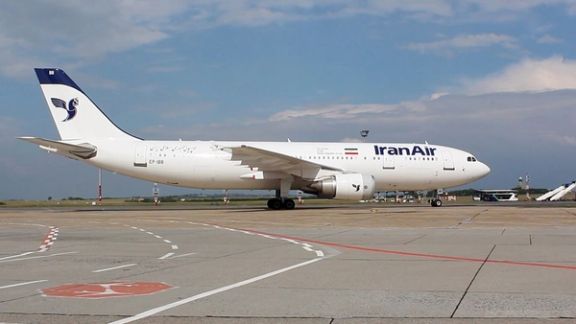
Iranian daily Jahan-e-Sanat has reported an alleged embezzlement case of about $19 million in the process of purchasing three aircraft by Iran’s national flag carrier, Iran Air.
The newspaper revealed on Wednesday that the airliner signed a contract through an intermediary company to buy three Airbus A319s at $44.3 million dollars in 2019, but when their documents were registered by banks their value was estimated to be $25.5 million.
Airbus A319 is a member of the Airbus A320 family of short- to medium-range, narrow-body, commercial passenger twin-engine jet airliners manufactured by Airbus, and its list price for a brand-new model can reach up to $100 million. Since the Islamic Republic is not allowed to buy new airplanes due to US sanctions, it has to buy used ones via brokers or intermediaries, which makes the pricing process an issue vulnerable to corruption by middlemen.
According to Alireza Barkhor, the deputy chairman of the Association of Iranian Airlines, more than 50 percent of Iran’s passenger planes are idle due to lack of spare parts, particularly engines.
The United States sanctions, which banned the sale of aircraft and parts to Iran in 1995, have practically made it impossible for most manufacturers to sell parts to Iran.
When the 2015 nuclear agreement went into effect, sanctions on purchases of Western aircraft were lifted and Iran began talks to buy aircraft from Boeing and Airbus. A few airbus planes were delivered but the Trump administration never approved sale of US planes until Washington withdrew from the JCPOA in May 2018 and reimposed sanctions.
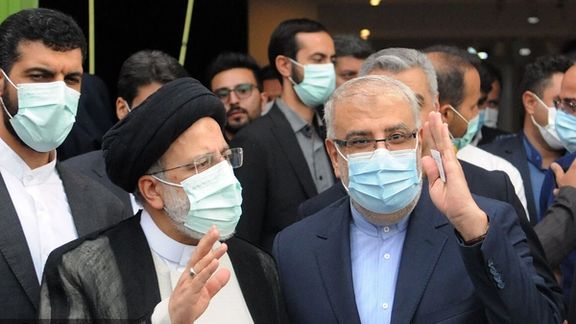
Iran’s government has tried to dispel reports about declining oil exports with its media claiming that sales have topped one million barrels a day in April-May.
In a long report that appeared on Tuesday on the official government news website IRNA and the official newspaper Iran Daily, President Ebrahim Raisi’s government tried to rebuttal those who say oil exports have decreased in the wake of Russia's invasion of Ukraine.
Global industry sources reported in May that Russia has started taking market share from Iran, especially in China, by offering more discounts. Reuters reported on May 19 that “Iran's crude exports to China have fallen sharply since the start of the Ukraine war as Beijing favored heavily discounted Russian barrels, leaving almost 40 million barrels of Iranian oil stored on tankers at sea in Asia and seeking buyers.”
The reports published in the government media indicate that the Raisi administration wants to dispel any sign of weakness in oil exports that it takes credit for. While it has little to show after 10 months in office, the government takes credit for increasing illicit oil exports despite United States’ sanction.
Iran’s currency has slipped to all-time lows against major currencies since March when nuclear talks with the West came to an abrupt pause and the prospect for a nuclear agreement that could lift sanctions is dimming by the day.
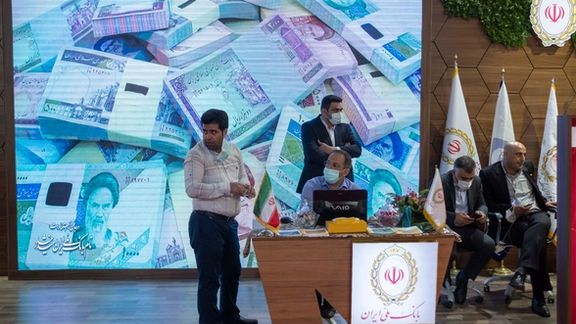
The government lifted food import subsidies in early May that led to a steep rise in prices triggering protests by a population impoverished after four years of high inflation.
The government’s denial of a loss in oil exports followed a two-track approach. First, the oil ministry was quoted as saying that demand and exports vary according to market conditions and it is trying to do its best to serve the nation’s interests.
“Supply and demand ratios in the global oil market are shaped by the policies of exporting and importing countries, the economic growth rate and other factors,” the ministry was quoted as saying by IRNA. It added that even if a supplier is eliminated from one market, the ratio of global supply and demand is not affected necessarily. Instead “the geography” of the market might change and Iran can try to sell its oil in new markets.
While the government mouthpiece, IRNA, tried to dispel the notion that Iran’s exports have fallen, the quotes from the oil ministry were vague and did not deny the news.
The government’s second tract was using its official newspaper, Iran Daily, to claim that oil exports have surpassed one million barrels per day, while international industry sources put the figure at around 700,000-800,000 barrels per day at best.
In its May report, Reuters cited shippers’ data that said about 40 million barrels of Iranian oil remained unsold on tankers, with 20 tankers “at anchor near Singapore as of mid-May.” The report also said that that Iranian exports to China dropped between 200,000 to 250,000 barrels per day, replaced by Russian oil after sanctions by US and other countries.
But IRNA insisted that from mid-March to mid-May, Iran was exporting around one million barrels, without citing the discounted price. If Iran charges $80 a barrel with a heavy discount, this could still generate around $2.5 billion a month. IRNA said that oil and petrochemical exports together totaled an average of $3.75 billion a month in this period, or $45 billion annually.
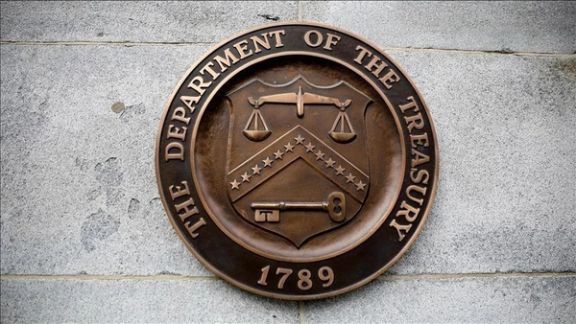
The US Treasury Department has sanctioned 16 individuals and groups affiliated with terrorist organizations, including three associated with Iran’s Revolutionary Guards' Quds Force.
The Terrorist Financing Targeting Center of the Office of Foreign Assets Control at the Department of the Treasury on Monday targeted a broad range of financiers of terrorism from a variety of regional terrorist designated organizations, including two groups affiliated the IRGC, whose “goal is to pave the way for Iran to exert greater influence in Bahrain and beyond.”
“The targets included three individuals associated with Iran’s Islamic Revolutionary Guard Corps Qods (Quds) Force, four ISIS-associated individuals and one company, six Boko Haram financiers, and terrorist groups Saraya al-Ashtar and Saraya al-Mukhtar,” read the treasury’s statement.
According to the treasury, Ali Qasir, Meghdad Amini, and Morteza Hashemi are part of two networks directed by and providing financial support to the Quds force and its Lebanese proxy group Hezbollah. The complex networks of intermediaries allow the Quds Force to obfuscate its involvement in selling Iranian oil.
Amini and Qasir are financial facilitators who direct a network of nearly 20 individuals and front companies, located in multiple countries, that has facilitated the movement and sale of tens of millions of dollars’ worth of gold, electronics, and foreign currency. Hashemi controls multiple companies based out of Hong Kong and mainland China and has used his access to the international financial system to broker contracts aimed at laundering vast sums of money.

Uncertainties in global energy were highlighted Sunday in a Bloomberg report that the United States may “turn more of a blind eye” to buyers of Iranian oil.
With oil prices up 50 percent in 2022 to almost $120 a barrel, Bloomberg reported a claim from Vitol Group, the world’s biggest independent crude trader, that the US might want to see more Iranian oil flow given mid-term elections looming in November.
Washington has since 2018, with its ‘maximum pressure’ sanctions, threatened punitive action against any third party buying Iranian crude or dealing with Tehran’s financial sector. While this slashed Iran’s exports from 2.5 million barrels per day (bpd) in 2017 to 400,000 bpd in 2020 with many buyers wary of being punished by the US, Iran is now selling around 800,000 bpd, mainly to China, and has developed means of hiding the trade from prying eyes.
Opec+, led by Saudi Arabia and Russia, agreed last week to accelerate output increases and President Joe Biden’s scheduled visit to Riyadh, although postponed until July, may signal an improvement in strained Saudi-US relations even if Riyadh maintains its good relations with Moscow.
But Vitol’s head of Asia Mike Muller told Bloomberg that prospects for the global oil market were confused by constraints on Russian exports and by production weaknesses across Opec. “There are people who think the market’s going to $135-$140 a barrel,” he said. “And there are people who think we’re going below $100 again.”
US gasoline hits $4.80
Analysts and diplomats are sanguine over prospects for renewing the 2015 Iran nuclear deal, the JCPOA (Joint Comprehensive Plan of Action), which would require the US ending ‘maximum pressure’ and lead to an additional 500,000-1 million bpd of Iranian oil reaching world markets.
Iran has around 100 million barrels in storage that could be eased onto the market even more quickly should the US turn a “blind eye” and ‘allow’ Iran to sell more oil. While Republicans and many Democrats oppose easing any Iran sanctions, especially ahead of Tehran returning its nuclear program to the limits set by the lapsed JCPOA, gasoline reaching $4.80 a gallon in the US, up from $3.80 in late February, piles political pressure on Biden and the Democratic Party.
Muller told Bloomberg he did not expect the US seizure of an Iranian-flagged vessel off Greece last month, which prompted Iran to detain two Greek tankers in the Persian Gulf, to signal more US tanker seizures.
Lawrence Norman of the Wall Street Journal tweeted that a well-informed source dismissed Vitol’s report that the Biden Administration might ‘allow’ Iran to sell more oil.
Critics of the Biden administration and supporters of ‘maximum pressure’ have accused the US of being lax in not taking more punitive action against buyers of Iranian crude. Nonetheless, Jason Brodsky, of the advocacy group United Against a Nuclear Iran, dismissed the Bloomberg report as “speculation.”